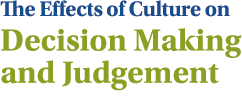
People with different cultural backgrounds have different expectations, norms and values, which in turn have the potential to influence their judgements and decisions as well as their subsequent behaviour. European Americans, for example, are generally influenced by the positive consequences of a decision, whereas Asians appear to be more influenced by the negative consequences that may occur due to a decision or line of action. Asians are therefore more "prevention" focused, manifesting a greater tendency to compromise, seek moderation or to postpone decisions if it is possible.
However, recent research shows that cultural norms and values are not the only criteria to influence behaviour. The extent to which they come into play also depend on situational factors, and how much the situation calls these norms and values to mind when the judgement or decision is being made.
The research commenced at the Hong Kong University of Science and Technology over six years ago with two separate grants from the Research Grants Council (RGC). It set out to better understand how cultural and individual difference factors have an influence on consumers' decision-making processes, a relatively new area of study. Initial research in this area was stimulated by Professor Donnel Briley's dissertation on the subject. Published by the Journal of Consumer Research (JCR) in 2000, it won the Robert Ferber Award for the best dissertation-related paper published in the Journal that year.
Subsequent work examined the implications of this research, demonstrating that motivational as well as chronic culture-related differences have an impact on consumer choice behaviour.
|